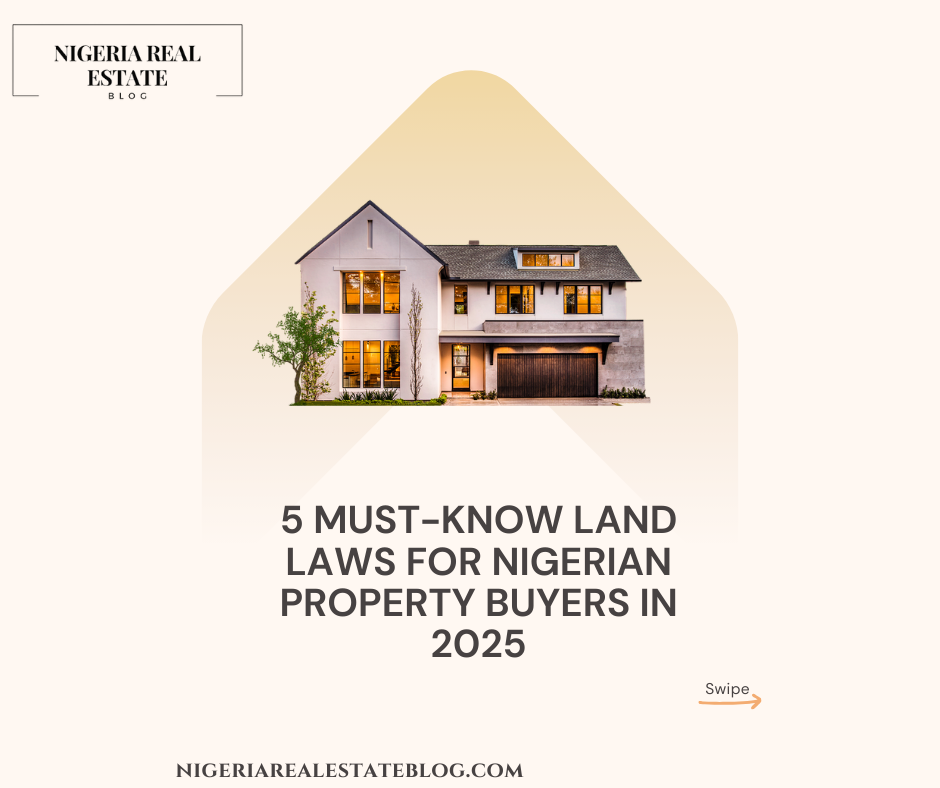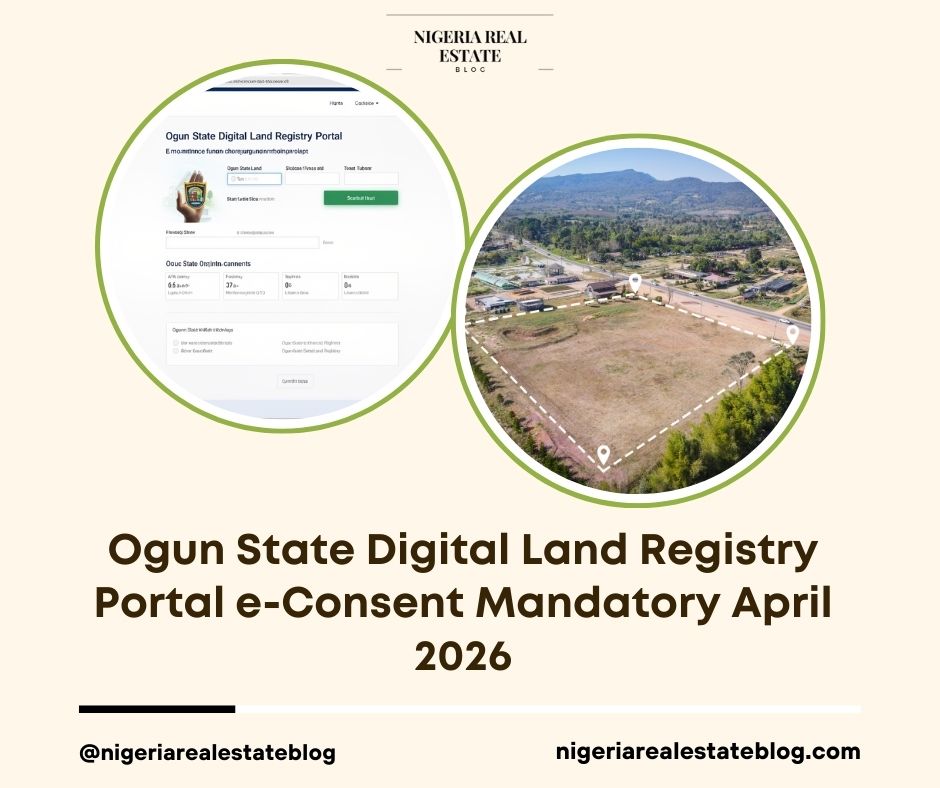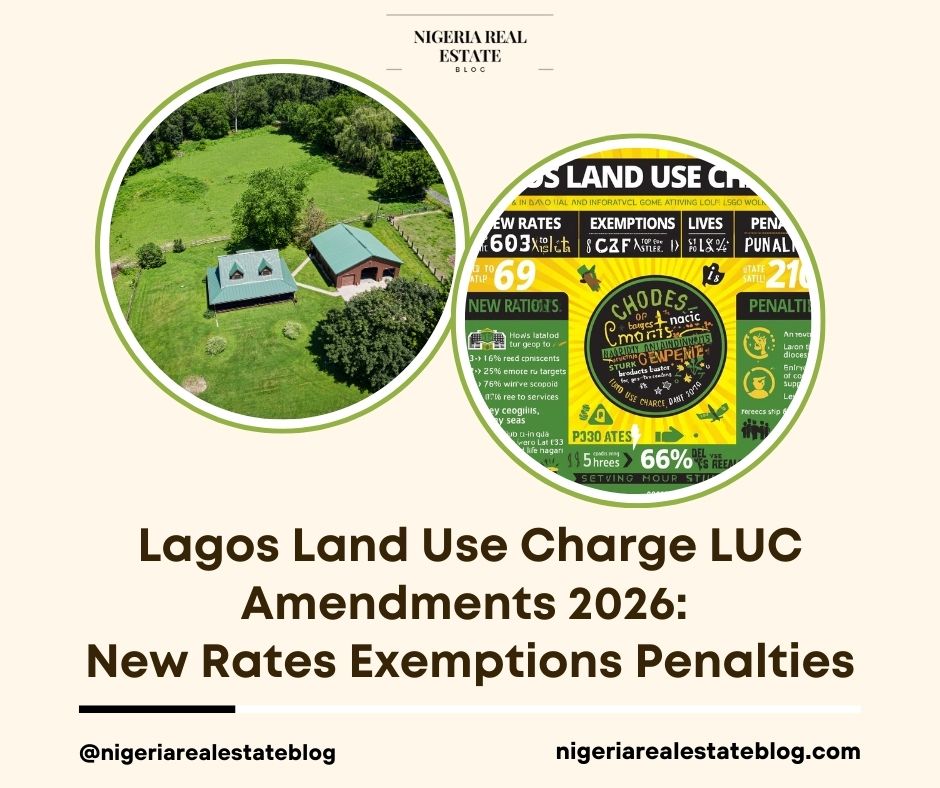
5 Must-Know Land Laws for Nigerian Property Buyers in 2025
Buying property in Nigeria can be a goldmine, with Lagos and Abuja markets offering 10–15% annual returns (source: Nigeria Property Centre, 2025). But with 30% of transactions facing legal disputes (source: ESVARBON, 2024), understanding land laws is critical to avoid scams or losses. Whether you’re a first-time buyer in Lekki, an investor in Abuja, or a diaspora Nigerian in the UK, Nigeria’s complex land laws can make or break your deal.
This Land Law guide shares 5 must-know land laws for Nigerian property buyers in 2025, with practical tips to protect your investment. From Lagos’s tenancy laws to verifying land titles, we’ve got you covered with examples and resources.
Table of Contents
-
Lagos Tenancy Law: One-Year Rent Cap
-
Certificate of Occupancy (C of O) Verification
-
Land Use Act 1978: Governor’s Consent
-
Omo-Onile Agreements: Avoiding Double Sales
-
Survey Plan Requirements
-
How to Stay Safe When Buying
1. Lagos Tenancy Law: One-Year Rent Cap
What It Is: The Lagos Tenancy Law 2025 caps advance rent at one year for new tenants.
Why It Matters: Protects buyers converting properties to rentals; non-compliance voids leases.
Cost: Legal advice, ₦20,000–₦50,000 (LASRERA-registered lawyers).
Example: Temi, a Lekki landlord, complied with the one-year cap, avoiding a ₦500,000 fine.
Tip: Register leases with LASRERA to enforce terms.
2. Certificate of Occupancy (C of O) Verification
What It Is: A C of O is the primary land title, issued by state governments.
Why It Matters: 20% of land sales involve fake titles (source: ESVARBON).
Cost: Verification, ₦50,000–₦100,000 at Lagos Lands Bureau.
Example: Chidi, an Abuja buyer, verified a ₦10M plot’s C of O, avoiding a ₦2M scam.
Tip: Cross-check with ESVARBON or state land registries.
3. Land Use Act 1978: Governor’s Consent
What It Is: All land sales require governor’s consent under the 1978 Land Use Act.
Why It Matters: Without consent, your purchase isn’t legally binding.
Cost: Consent fees, 3–5% of property value (₦150,000 for a ₦5M plot).
Example: Aisha, a diaspora investor, paid ₦200,000 for consent on a ₦6M Lagos plot, securing her title.
Tip: Hire a lawyer to process consent in 30–60 days.
4. Omo-Onile Agreements: Avoiding Double Sales
What It Is: Omo-Onile (land-owning families) must sign agreements to prevent reselling your land.
Why It Matters: 15% of disputes involve double sales by Omo-Onile (source: Nigeria Property Centre).
Cost: Agreement fees, ₦50,000–₦200,000.
Example: Emeka, a buyer in Ibadan, paid ₦100,000 for an Omo-Onile agreement, preventing a rival claim.
Tip: Record agreements with a notary public (₦10,000).
Cross-Link: Explore investment options in our investing guide.
5. Survey Plan Requirements
What It Is: A survey plan maps your land’s boundaries, registered with the Surveyor-General.
Why It Matters: Unregistered plans lead to boundary disputes (10% of cases).
Cost: Survey, ₦100,000–₦300,000 in Lagos/Abuja.
Example: Ngozi, a Port Harcourt buyer, spent ₦150,000 on a survey, avoiding a neighbor’s encroachment.
Tip: Use licensed surveyors via Nigerian Institution of Surveyors (nis.org.ng).
6. How to Stay Safe When Buying
-
Hire a Lawyer: Spend ₦50,000–₦100,000 for due diligence.
-
Verify Titles: Check C of O with state registries (₦50,000).
-
Get Consent: Budget 3–5% for governor’s consent.
-
Secure Agreements: Pay Omo-Onile fees with legal backing.
-
Register Surveys: Use licensed surveyors for valid plans.
Protect Your Property Investment
Nigeria’s real estate market is lucrative but risky. These Land Law tips ensure your 2025 purchase is safe and profitable. Share this guide to help others avoid pitfalls!
Share This Post: Post on LinkedIn, X, WhatsApp, or Instagram to spread the knowledge! 📜
Cross-Link: Check Eko Atlantic updates in our news guide.
Subscribe to Nigeria Real Estate Blog for more land law insights, investing tips, and proptech updates!


